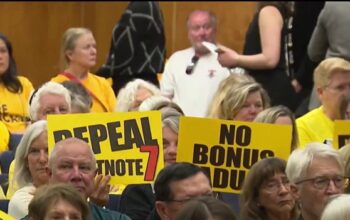If a law enforcing person became President, the illegal aliens that voted in the San Fran elections would be prosecuted and then deported.
“Because of the lawsuit, OCEIA Executive Director Jorge Rivas said there was, among immigrants, “a lot of uncertainty around what they could say and do.”
Personal Risks
Atop the registration for noncitizens, the Department of Elections warns that the personal information a voter shares is public and could be obtained by Immigration and Customs Enforcement.
At some point a civil rights lawsuit will be filed and those that voted will be deported. Maybe we should make sure more vote?
Why aren’t more noncitizens voting in San Francisco?

By Adam Shanks, SF Examiner, 8/14/23 https://www.sfexaminer.com/news/politics/why-more-noncitizens-arent-voting-in-sf-school-races/article_be7cd5b4-37d1-11ee-bc57-97bd1533bffd.html
San Francisco took a bold step in 2016 by allowing noncitizens to vote in school board elections, but relatively few ever cast a ballot.
In one election — the 2019 school board race — just two people voted under the new law, which expanded voting rights in school elections to noncitizen parents and guardians of children under 18 in the San Francisco school district.
Even in the hotly contested 2022 recall of three school board members, only 235 people cast a ballot under the program.
Despite the important victory for immigrants secured in 2016, advocates say numerous obstacles remain to increase voter participation among noncitizens in San Francisco.
Despite low turnout, advocates maintain that there are benefits to extending the vote to noncitizens that might not show up in election statistics. If nothing else, they say, it imbues an inclusivity that improves the welfare of not only the children of immigrants but the school district as a whole.
“When you have parents more involved in their kids’ classrooms and schools and the system in general, it improves education outcomes. The students do better,” said Ron Hayduk, a political science professor at San Francisco State University and member of the Immigrant Parent Voting Network.
Still, advocates hope they can improve immigrant parent turnout by addressing several hurdles. Those include the same faced by the traditional voting population, who may feel they don’t have enough information to vote or that their votes don’t matter. But for immigrant parents, “it’s not just about changing hearts and minds” when it comes to voting, said Annette Wong, managing director of programs at Chinese for Affirmative Action, a nonprofit that fought for Proposition N.
“There are additional hurdles on top of those that are very systemic and structural,” Wong said.
A legal challenge
The City’s policy has been subjected to a legal challenge by a conservative nonprofit that argues it violates the Constitution.
Earlier this month, a state appeals court upheld San Francisco’s law, siding with The City’s belief that it has the authority to extend voting rights to noncitizens.
The implications of the court battle are significant for San Francisco, where about one-third of residents are immigrants and about 44,000 people are eligible to vote under Proposition N, according to the Office of Civic Engagement and Immigrant Affairs.
It also has implications for Oakland, which passed a similar measure last year, and other California cities pondering similar policies.
Because of the lawsuit, OCEIA Executive Director Jorge Rivas said there was, among immigrants, “a lot of uncertainty around what they could say and do.”
Personal Risks
Atop the registration for noncitizens, the Department of Elections warns that the personal information a voter shares is public and could be obtained by Immigration and Customs Enforcement.



